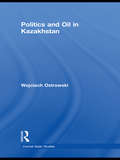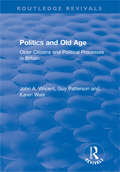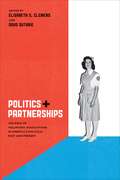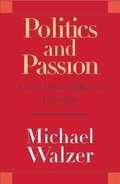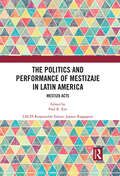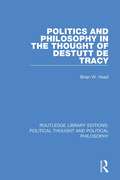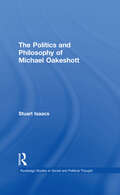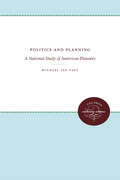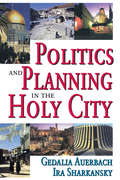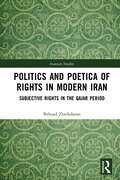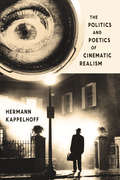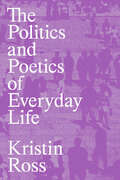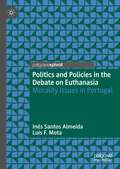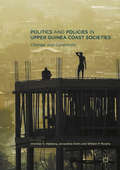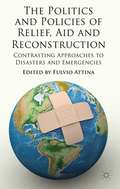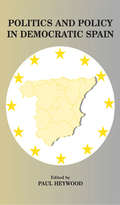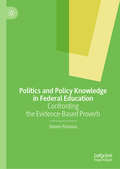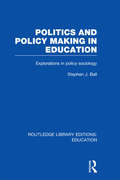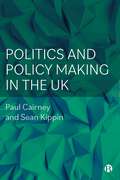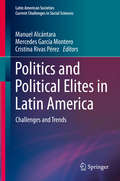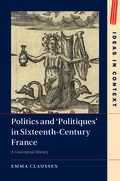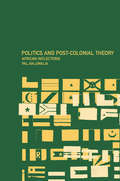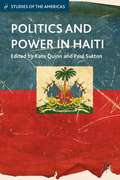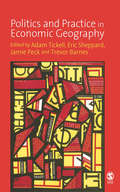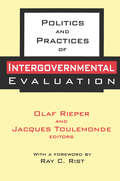- Table View
- List View
Politics and Oil in Kazakhstan (Central Asian Studies)
by Wojciech OstrowskiIn Kazakhstan, the oil industry plays a crucial role in its economic and political life due to the country’s considerable oil revenues and accompanying conflicting interests. As an arena of political struggle, this industry provides a good test case for uncovering regime maintenance techniques. This book examines the ways in which the post-Soviet Kazakh regime has managed to sustain itself in power, and the regime maintenance techniques it has used in the process of establishing and upholding its position. It scrutinizes the tools that the Kazakh regime employed in order to bring the country’s oil industry under its control and, while doing so, shifts the emphasis from the prevalent zhuz-horde, tribe, and clan-based approaches to Kazakh politics towards corporatism and patron-client mechanisms of control. Based on extensive field work in Kazakhstan and in-depth interviews with high ranking representatives of companies working in Kazakhstan’s oil and gas industry, both local and foreign, the National Oil Company and its subsidiaries, government agencies, foreign diplomats, journalists and representatives of oppositional parties and NGOs, this book provides a comprehensive study of the issues of politics of oil and state-business relationships in Kazakhstan.
Politics and Old Age: Older Citizens and Political Processes in Britain (Routledge Revivals)
by John A. Vincent Guy Patterson Karen WaleThis title was first published in 2001. Older people have been characterized by two mutually contradictory stereotypes. One the one hand they have been portrayed as a powerful lobby, growing demographically and able to demand large redistributions of the nation's income in their direction. On the other hand they have been typified as a marginalized group at high risk of poverty and exclusion and, in a political context, largely powerless. This book examines, using original research conducted by the Older People and Politics Project (OPPOL) within Exeter University's Sociology Department, the reality of the impact of the increasing number of older people on the British political process. The project had three main investigative concerns: how effective are pressure groups and lobbyists for older people?; how is the power and influence of older people perceived by older people themselves and the general public?; and how are politicians responding to older people and their needs?
Politics and Partnerships: The Role of Voluntary Associations in America's Political Past and Present
by Elisabeth S. Clemens Doug GuthrieExhorting people to volunteer is part of the everyday vocabulary of American politics. Routinely, members of both major parties call for partnerships between government and nonprofit organizations. These entreaties increase dramatically during times of crisis, and the voluntary efforts of ordinary citizens are now seen as a necessary supplement to government intervention. But despite the ubiquity of the idea of volunteerism in public policy debates, analysis of its role in American governance has been fragmented. Bringing together a diverse set of disciplinary approaches, Politics and Partnerships is a thorough examination of the place of voluntary associations in political history and an astute investigation into contemporary experiments in reshaping that role. The essays here reveal the key role nonprofits have played in the evolution of both the workplace and welfare and illuminate the way that government’s retreat from welfare has radically altered the relationship between nonprofits and corporations.
Politics and Passion: Toward a More Egalitarian Liberalism
by Michael WalzerThe distinguished political philosopher Michael Walzer offers a critique of liberal theory and demonstrates that crucial realities have been submerged in the evolution of contemporary liberal thought. In the standard versions of liberal theory, autonomous individuals deliberate about what ought to be done but in the real world, citizens also organize, mobilize, bargain, and lobby. The real world is more contentious than deliberative. Ranging over hotly contested issues including multiculturalism, pluralism, difference, civil society, and racial and gender justice, Walzer suggests ways in which liberal theory might be revised to make it more hospitable to the claims of equality. Combining profound learning with practical wisdom, Michael Walzer offers a provocative reappraisal of the core tenets of liberal thought. Politics and Passion will be required reading for anyone interested in social justice and the means by which we seek to achieve it.
The Politics and Performance of Mestizaje in Latin America: Mestizo Acts
by Paul K. Eiss Joanne RappaportThe term "mestizaje" is generally translated as race mixture, with races typically understood as groups differentiated by skin color or other physical characteristics. Yet such understandings seem contradicted by contemporary understandings of race as a cultural construct, or idea, rather than as a biological entity. How might one then approach mestizaje in a way that is not definitionally predicated on ‘race,’ or at least, on a modernist formulation of race as phenotypically expressed biological difference? The contributors to this volume provide explorations of this question in varied Latin American contexts (Mexico, Guatemala, Bolivia, Colombia, Peru), from the16th century to the present. They treat ‘mestizo acts’ neither as expressions of pre-existing social identities, nor as ideologies enforced from above, but as cultural performances enacted in the in-between spaces of social and political life. Moreover, they show how ‘mestizo acts’ not only express or reinforce social hierarchies, but institute or change them – seeking to prove – or to dismantle – genealogies of race, blood, sex, and language in public and political ways. The chapters in this book originally published as a special issue of Latin American and Caribbean Ethnic Studies.
Politics and Philosophy in the Thought of Destutt de Tracy (Routledge Library Editions: Political Thought and Political Philosophy #29)
by Brian W. HeadFirst published in 1987. This study describes and analyses the published writings of the French philosopher Antoine Destutt de Tracy. The author focuses on the three decades from the calling of the Etats-généraux to the early years of the Restoration – the period of Tracy’s entire literary production, and the period of his greatest influence and reputation. This title will be of great interest to students of history, philosophy and politics.
The Politics and Philosophy of Michael Oakeshott (Routledge Studies in Social and Political Thought)
by Stuart IsaacsMichael Oakeshott was a leading Political theorist described by The Telegraph in 1990 as "the greatest political philosopher in the Anglo-Saxon tradition since Mill – or even Burke". There has been sustained interest in his work, and a developing body of literature, over recent years. This book offers a clearly written and accessible critical analysis: it presents complex theories and concepts in a way that will introduce new readers to Oakeshott’s work, and at the same time offers a fresh approach for those already familiar with his philosophy. The Politics and Philosophy of Michael Oakeshott reveals how his work relates to contemporary political philosophy (for example, Arendt, Rorty, Rawls); and moreover, how it links to broader debates within philosophy and the social sciences and, building upon the work of Devigne, through to postmodernism. This book brings together the disparate influences that have, at various times, been associated with Oakeshott’s work, and draws from a number of essays which have been published posthumously. Referring to these, and other more well-known texts, the author makes sense of the many dimensions of Oakeshott’s work by placing a moral concern as central to his system of thought. All in all this book considers the recently published ‘lesser-known’ essays as well as the latest secondary appraisals of Oakeshott’s work, which sets his thought in the contemporary political environment of the twenty-first century. This much-needed text with be of great interest to students and researchers in political science and philosophy.
Politics and Planning: A National Study of American Planners
by Michael Lee VasuVasu analyzes the attitudes of a national sample of both public and private planners, using a questionnaire he devised and administered, and contrasts the results with a nationwide sample of the American public. He finds that planners are a distinct interest group with ideological orientations, political party affiliations, and political participation that differ significantly from those of the American public.A UNC Press Enduring Edition -- UNC Press Enduring Editions use the latest in digital technology to make available again books from our distinguished backlist that were previously out of print. These editions are published unaltered from the original, and are presented in affordable paperback formats, bringing readers both historical and cultural value.
Politics and Planning in the Holy City
by Gedalia Auerbach Ira SharkanskyJerusalem is not just another city that illustrates the conflict between interests of professional planners and competing political perspectives. It is the Holy City, with a history of some 3,000 years. Moreover, numerous layers of historical remains have importance for intense and competitive religious and national interests. Israelis claim it as the capital of their country, and Palestinians want it--or part of it--as the capital of their not yet created state.Jerusalem is also a place where more than 700,000 people live, and the center of a metropolitan area with more than twice that number. Along with religious and national interests, there are the customary conflicts between what various groups--property developers, politicians, professional planners, neighborhood residents, and environmental activists--want to do with the land. Politics and Planning in the Holy City describes and analyzes the tensions between politics and planning.The authors tackle the economic, social, and political contexts that shape conflicts. Such problems include deciding what should be called Jerusalem and difficulties surrounding the construction of a defense barrier to protect Israelis from Palestinian terrorists--in the framework of a multicultural city where 30 to 40 percent of its residents are Palestinians. There is dissent over locating rail lines to the city, as some interests want them here, there, or nowhere, and over building a light rail line within a city already crowded and beset with conflicting interests. The creation of a football stadium is another venue for conflict, as many religious Jews view sports as a threat to their way of life.Issues include locating a site for housing new immigrants, as few Jerusalemites want large numbers of newcomers in their neighborhoods, and deciding which sites merit preservation in a city with many deserving candidates, but severely limited resources. This volume will attract urban specialists as well as those concerned with larger p
Politics and Poetica of Rights in Modern Iran: Subjective Rights in the Qajar Period (Iranian Studies)
by Behzad ZerehdaranThis book delves into the history of subjective rights within the context of 19th-century Iran, specifically during the eventful Qajar era. The crux of its research lies in the emergence and evolution of the concept of subjective rights as opposed to the notion of objective rights. During this pivotal period, this transition marked a paradigm shift from “right as to be right” to “right as to have a right.” A central pillar of this book is the creation of a meta-theory, one that sheds light on the semantical evolution of the concept of rights. Within these pages, readers will find a concise history, tracing the conceptual path that led from the objective to the subjective realm of rights. In addition to these historical explorations, it delves into the intricate field of rights theory, investigating the foundations and justifications of rights. Employing the Hohfeldian framework, it analyses various conceptions of rights as they manifest within travel literature, enlightenment literature, and dream literature of the Qajar era. This book will be of interest to scholars and students with an interest in Iranian studies, Iranian history, Persian literature and human rights.
The Politics and Poetics of Cinematic Realism (Columbia Themes in Philosophy, Social Criticism, and the Arts)
by Hermann KappelhoffHermann Kappelhoff casts the evolution of cinema as an ongoing struggle to relate audiences to their historical moment. Appreciating cinema's unique ability to bind concrete living conditions to individual experience (which existing political institutions cannot), he reads films by Sergei Eisenstein and Pedro Almodóvar, by the New Objectivity and the New Hollywood, to demonstrate how cinema situates spectators within society. Kappelhoff applies the Deleuzean practice of "thinking in images" to his analysis of films and incorporates the approaches of Jacques Rancière and Richard Rorty, who see politics in the permanent reconfiguration of poetic forms. This enables him to conceptualize film as a medium that continually renews the audiovisual spaces and temporalities through which audiences confront reality. Revitalizing the reading of films by Visconti, Fassbinder, Kubrick, Friedkin, and others, Kappelhoff affirms cinema's historical significance while discovering its engagement with politics as a realm of experience.
The Politics and Poetics of Everyday Life
by Kristin RossUsing the concept of the everyday as a lever for social transformationThe texts in this volume represent Kristin Ross&’s attempt to think the question of the everyday across a range of discourses, practices and knowledges, from philosophy to history, from the visual arts to popular fiction, all the way to the forms taken by collective political action in the territorial struggles of today. If everyday life is, as many have come to believe, the ideal vantage point for an analysis of the social, it is also the crucial first step in its transformation.The volume opens with a return to Henri Lefebvre&’s powerful attempt to use the everyday as both residue and resource, as the site of profound alienation and—by the same token—the site where all emancipatory initiatives and desires begin.The second section focuses on our attempts to represent our lived reality to ourselves in cultural forms, from painting and literature and film to an analysis of the contemporary transformations of the sub-genre most embedded in the deep superficiality of everyday life: detective fiction.The final section turns to present-day ecological occupations in the wake of the zad at Notre-Dame-des-Landes, and locates the everyday as a site for rich oppositional resources and immanent social creativity.
Politics and Policies in the Debate on Euthanasia: Morality Issues in Portugal
by Inês Almeida Luís MotaThis book analyses the political and public debates about euthanasia in Portugal. Utilising petitions submitted to Parliament, legislative bills, parliamentary debates, opinion articles in newspapers, and documents published by the Catholic Church, it examines this sensitive issue through the theoretical lens of morality politics. It does so by studying the process of political dispute between advocacy coalitions formed by political parties and societal actors. This is the first book to comprehensively analyse a morality issue in Portugal, a predominantly Catholic country that has taken an innovative and liberal stance on many morality issues over the last two decades. It will appeal to students and scholars of sociology, political science, public policy and bioethics, as well as policymakers and other interest groups.
Politics and Policies in Upper Guinea Coast Societies
by Christian K. Højbjerg Jacqueline Knörr William P. MurphyThis book examines the radical changes in social and political landscape of the Upper Guinea Coast region over the past 30 years as a result of civil wars, post-war interventions by international, humanitarian agencies and peacekeeping missions, as well as a regional public health crisis (Ebola epidemic). The emphasis on 'crises' in this book draws attention to the intense socio-transformations in the region over the last three decades. Contemporary crises and changes in the region provoke a challenge to accepted ways of understanding and imagining socio-political life in the region - whether at the level of subnational and national communities, or international and regional structures of interest, such as refugees, weapon trafficking, cross-border military incursions, regional security, and transnational epidemics. This book explores and transcends the central explanatory tropes that have oriented research on the region and re-evaluates them in the light of the contemporary structural dynamics of crises, changes and continuities.
The Politics and Policies of Relief, Aid and Reconstruction: Contrasting Approaches to Disasters and Emergencies
by Fulvio AttinàDisaster policies present a new challenge to the practitioners and students of global politics; this book explains how political science enriches the contribution of the social sciences to the study of disaster relief, aid and reconstruction following the major disaster events, both natural and man-made, of recent times.
Politics and Policy in Democratic Spain: No Longer Different?
by Paul HeywoodSpain is different" was a favourite tourist board slogan of the Franco dictatorship. Is Spain still different? This volume provides an original series of analyses of how politics in democratic Spain has developed since the remarkable success of the transition to democracy.
Politics and Policy Knowledge in Federal Education: Confronting the Evidence-Based Proverb
by Steven PutansuPolicy knowledge derived from data, information, and evidence is a powerful tool for contributing to policy discussions and debates, and for understanding and improving the effectiveness, efficiency, and equity of government action. For decades, politicians, advocates, reformers, and researchers have simultaneously espoused this value, while also paradoxically lamenting the lack of impact of policy knowledge on decision making, and the failure of related reforms. This text explores this paradox, identifying the reliance on a proverb of using policy knowledge to supplant politics as a primary culprit for these perceived failures. The evidence in this book suggests that any consideration of the role of policy knowledge in decision making must be considered alongside, rather than in place of, considerations of the ideologies, interests, and institutional factors that shape political decisions. This contextually rich approach offers practical insights to understand the role of policy knowledge, and to better leverage it to support good governance decisions.
Politics and Policy Making in Education: Explorations in Sociology (Routledge Library Editions: Education)
by Stephen J. BallBased on interviews with key actors in the policy-making process, this book maps the changes in education policy and policy making in the Thatcherite decade. The focus of the book is the 1988 Education Reform Act, its origins, purposes and effects, and it looks behind the scenes at the priorities of the politicians, civil servants and government advisers who were influential in making changes. Using direct quotations from senior civil servants and former secretaries of state it provides a fascinating insight into the way in which policy is made. The book focuses on real-life political conflicts, examining the way in which education policy was related to the ideal of society projected by Thatcherism. It looks in detail at the New Right government advisers and think tanks; the industrial lobby, addressing issues such as the National Curriculum, national testing and City Technical Colleges. The author sets these important issues within a clear theoretical framework which illuminates the whole process of policy making.
Politics and Policy Making in the UK
by Paul Cairney Sean KippinOver the past decade, the UK has experienced major policy and policy making change. This text examines this shifting political and policy landscape while also highlighting the features of UK politics that have endured. Written by Paul Cairney and Sean Kippin, leading voices in UK public policy and politics, the book combines a focus on policy making theories and concepts with the exploration of key themes and events in UK politics, including: • developing social policy in a post-pandemic world; • governing post-Brexit; and • the centrality of environmental policy. The book equips students with a robust and up-to-date understanding of UK public policy and enables them to locate this within a broader theoretical framework.
Politics and Political Elites in Latin America: Challenges and Trends (Latin American Societies)
by Manuel Alcántara Mercedes García Montero Cristina Rivas PérezThis book presents in-depth analyses of the data gathered for 26 years by the Political Elites of Latin America project (PELA), the most comprehensive database about the topic in the world. Since 1994, PELA has conducted around 9,000 personal interviews with representative samples of the Legislative Powers of 18 Latin American countries, generating a unique resource for the study of political elites in a comparative perspective. Now, this contributed volume brings together studies that dig into the data gathered by PELA to discuss important topics related to the challenges faced by representative democracy in Latin America. After an introductory chapter that presents the potential of the PELA database, the book is structured in two parts. The first addresses in eight chapters important aspects of representative democracy such as political ambition, political trust, satisfaction with democracy, clientelism and the quality of democracy. It then discusses three relevant issues in Latin American political dynamics such as executive-legislative relations, women's participation as representatives, and the meaning of China and the United States in national politics.The second part addresses in five chapters studies of seven national cases that are representative of regional heterogeneity. These chapters aim to examine parliamentarian elites’ attitudes in different political systems with regard to a variety of relevant issues such as institutional trust, satisfaction with democracy, Executive-Legislative relations, clientelism, and gender questions. Furthermore, these chapters intend to evince the evolution of such attitudes in the course of the last two decades.Politics and Political Elites in Latin America: Challenges and Trends will be of interest to scholars and students of comparative politics in general and, more particularly, to those interested in the challenges faced by representative democracy not only in Latin America, but in many parts of the world.
Politics and ‘Politiques' in Sixteenth-Century France: A Conceptual History (Ideas in Context #134)
by Emma ClaussenDuring the French Wars of Religion, the nature and identity of politics was the subject of passionate debate and controversy. The word 'politique', in both sixteenth-century and contemporary French, refers to the theory and practice of politics - 'la politique' - and the statesman or politician - 'le politique' - who theorised and practised this art. The term became invested with significance and danger in early modern France. Its mobilisation in dialogues, treatises, debates, and polemics of the French Wars of Religion was a crucial feature of sixteenth-century experiences of the political. Emma Claussen investigates questions of language and power over the course of a tumultuous century, when politics, emerging as a discipline in its own right, seemed to offer a solution to civil discord but could be fatally dangerous in the wrong hands. By placing this important term in the context of early modern political, doctrinal and intellectual debates, Emma Claussen demonstrates how politics can be understood in relation to the wider linguistic and conceptual struggles of the age, and in turn influenced them.
Politics and Post-Colonial Theory: African Inflections
by Pal AhluwaliaThis groundbreaking book makes sense of the complexities and dynamics of post-colonial politics, illustrating how post-colonial theory has marginalised a huge part of its constituency, namely Africa.Politics and Post-Colonial Theory traces how African identity has been constituted and reconstituted by examining issues such as:* negritude* the rise of nationalism* decolonisation.The book also questions how helpful post-colonial analysis can be in understanding the complexities which define institutions including:* the nation-state* civil society* human rights* citizenship.Politics and Post-colonial Theory bravely breaks down disciplinary boundaries. Its radical vision will be essential reading for all those engaged in Politics, post-colonial studies and African studies.
Politics and Power in Haiti
by Kate Quinn Paul SuttonExamining the political legacies of the Duvalier period and after, and revisiting the work of the late David Nicholls, Politics and Power in Haiti provides some of the keys to understanding the turbulent world of Haitian politics and the persistent challenges at home and from abroad which have distorted development.
Politics and Practice in Economic Geography
by Trevor J. Barnes Eric Sheppard Adam Tickell Jamie A. Peck'Fortunately, to the benefit of students young and old, the reflexive ruminations contained between these covers are fresh, penetrating, honest, personal and, at times, poignant. They are sure to stimulate a long-overdue reawakening of interest in methodological choice and its consequences in economic geography. In doing so, the contributors to this volume have performed an incredibly valuable service on behalf of economic geographers everywhere' - Professor Meric S. Gertler, University of Toronto, Canada 'The biggest strength of the book is its pedagogic design, which will appeal to new entrants in the field but also leaves space for methodological debates... It is well suited for use on general courses but it also involves far more than an introduction and is full of theoretical insights for a more theoretically advanced audience' - Economic Geography Research Group In the last fifteen years economic geography has experienced a number of fundamental theoretical and methodological shifts. Politics and Practice in Economic Geography explains and interrogates these fundamental issues of research practice in the discipline. Concerned with examining the methodological challenges associated with that 'cultural turn', the text explains and discusses: - qualitative and ethnographic methodologies; - the role and significance of quantitative and numerical methods; - the methodological implications of both post-structural and feminist theories; - the use of case-study approaches; - the methodological relation between the economic geography other disciplines like neoclassical economics, economic sociology, and economic anthropology. Leading contributors examine substantive methodological issues in economic geography and make a distinctive contribution to economic-geographical debate and practice. This will be an essential primer for all students of economic geography, as well as human geography more generally.
Politics and Practices of Intergovernmental Evaluation (Comparative Policy Evaluation Ser.)
by Ray C. RistGreat intellectual effort has gone into the development of sophisticated designs and methodologies to study individual policies, programs, and projects. Costly efforts to find the smallest evidence of a policy or program impact have been undertaken in the presumption that such data are central to policy decision making. Meanwhile, the intergovernmental nature of political and policy governance has been ignored. Whether it is Canada, the United States, England, Denmark, Sweden, Germany, Japan, or any other industrial country, the governmental structure is essentially a web of interrelated policies, programs, and projects. To understand local responsibilities and requirements, one must also understand the role that regional and national governmental agencies and administrations play. Politics and Practice of Intergovernmental Evaluation is a landmark work in the area of the evaluation of intergovernmental policies, programs, and projects. Comparative and cross-national in its perspective, the material presented here not only provides a systematic theoretical and empirical treatment of intergovernmental evaluation, but does so with case material from seven nations and the European Union. No other such comparative work exists on this topic. Contributors include: Jan Eric Furubo; Mary Henkel; Linda G. Morra; Robert V. Segsworth and Dale H. Poel; and Willi Zimmermann and Peter Knoepfel. The Politics and Practice of Intergovernmental Evaluation will be of interest to political theorists, policymakers, and scholars and students of government and the evaluation community.
